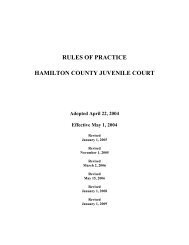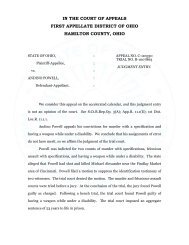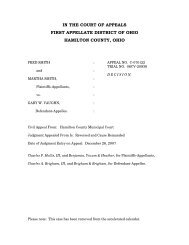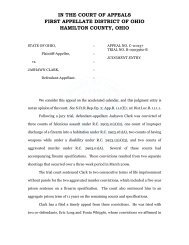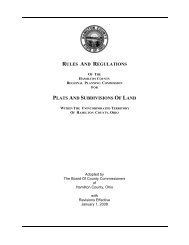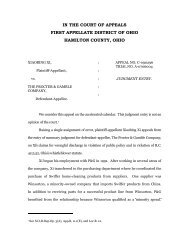Greene v. Cincinnati - Hamilton County, Ohio
Greene v. Cincinnati - Hamilton County, Ohio
Greene v. Cincinnati - Hamilton County, Ohio
You also want an ePaper? Increase the reach of your titles
YUMPU automatically turns print PDFs into web optimized ePapers that Google loves.
IN THE COURT OF APPEALSFIRST APPELLATE DISTRICT OF OHIOHAMILTON COUNTY, OHIOEDWARD GREENE,Plaintiff-Appellant,vs.CITY OF CINCINNATI,Defendant-Appellee.:::::APPEAL NO. C-120079TRIAL NO. A-0706066O P I N I O N.Civil Appeal From: <strong>Hamilton</strong> <strong>County</strong> Court of Common PleasJudgment Appealed From Is: AffirmedDate of Judgment Entry on Appeal: November 21, 2012Bruce B. Whitman, for Plaintiff-Appellant,John P. Curp, City Solicitor, and Augustine Giglio, Assistant City Solicitor, forDefendant-Appellee.Please note: This case has been removed from the accelerated calendar.
OHIO FIRST DISTRICT COURT OF APPEALSHILDEBRANDT, Presiding Judge.{1} Plaintiff-appellant Edward <strong>Greene</strong> appeals the judgment of the <strong>Hamilton</strong><strong>County</strong> Court of Common Pleas confirming an arbitration award in favor of defendant-appelleecity of <strong>Cincinnati</strong>. The arbitration was conducted after the city had terminated <strong>Greene</strong>’semployment as a police sergeant.<strong>Greene</strong>’s Alleged Misconduct{2} <strong>Greene</strong> was employed as a sergeant in the city’s Telephone Crime ReportingUnit. In that capacity, he oversaw a number of employees, whose essential task was to answercitizen calls and provide proper response. In 2004, Lieutenant Jeffrey Butler was transferredinto <strong>Greene</strong>’s unit and became his supervisor. Almost immediately, their working relationshipwas tumultuous.{3} At the arbitration hearing, the city presented evidence that <strong>Greene</strong> had failed tofollow even the most routine requests made by Butler. The record is replete with instances of<strong>Greene</strong>’s failure to respond to Butler’s emails, failure to properly discipline employees, refusalto follow the proper chain of command in submitting requests for leave, failure to inspectequipment, being absent without leave, and numerous other derelictions of duty. In response tothese lapses, Butler prepared a number of “ESLs,” which were log entries that documented theinstances of misconduct.{4} Butler testified that on many occasions, he had attempted to amicably resolvethese issues with <strong>Greene</strong>, only to be met with resistance and even outright hostility. On March16, 2005, Butler called <strong>Greene</strong> into his office to discuss a new report-tracking procedure for theunit. According to Butler, <strong>Greene</strong> had said that he did not “accept” the new policy and beganto leave Butler’s office. When Butler ordered <strong>Greene</strong> to remain, <strong>Greene</strong> said, “Go ahead andcharge me with insubordination,” and he left the office.{5} Then, on May 24, 2005, Butler called <strong>Greene</strong> into his office to discuss amemorandum that <strong>Greene</strong> had failed to submit on time. Butler testified that <strong>Greene</strong> had2
OHIO FIRST DISTRICT COURT OF APPEALSbecome belligerent, approaching Butler with his hands raised. After Butler ordered <strong>Greene</strong> toleave his office, <strong>Greene</strong> walked away, but he repeatedly stated in a loud voice, “You look likeyou want to beat me down. Do you want to beat me down?” Butler stated that he feltthreatened by <strong>Greene</strong>’s tone of voice and his body posture.{6} Although <strong>Greene</strong> contended that his termination was the result of racialdiscrimination, the arbitrator found that contention unpersuasive. The arbitrator concluded thatthe city had proved its allegations of insubordination and that termination was the appropriatepenalty.{7} <strong>Greene</strong> filed a motion with the trial court to vacate the arbitrator’s award.After a hearing before a magistrate, the magistrate recommended that the award be upheld. OnOctober 1, 2010, the trial court issued a decision denying the motion to vacate the award, and<strong>Greene</strong> appealed. But because the trial court had not explicitly ruled on the objections to themagistrate’s report, this court dismissed the appeal for lack of a final appealable order. <strong>Greene</strong>v. <strong>Cincinnati</strong>, 1st Dist. No. C-100715 (Aug. 5, 2011).{8} Following our dismissal, the trial court issued an entry overruling theobjections, and <strong>Greene</strong> filed the instant appeal.The Trial Court’s Compliance with Civ.R. 53{9} In his first assignment of error, <strong>Greene</strong> argues that the trial court erred byfailing to properly rule on his objections to the magistrate’s decision.{10} As we stated in the first appeal of this matter, Civ.R. 53(D)(4)(d) mandatesthat a trial court rule on objections before entering judgment. In this regard, we have noted that“[a]n essential component of a trial court’s judicial function is to review and ratify amagistrate’s decision before it becomes effective.” Coors v. Maceachen, 1st Dist. No. C-100013, 2010-<strong>Ohio</strong>-4470, 27, citing Yantek v. Coach Builders Ltd., Inc., 1st Dist. No. C-060601, 2007-<strong>Ohio</strong>-5126, 10. Although an unstated disposition of objections in a “barebones”judgment entry is inconsistent with Civ.R. 53(D)(4)(d), a trial court does have latitude3
OHIO FIRST DISTRICT COURT OF APPEALSin the manner in which it demonstrates compliance with the rule. Chan v. TASR, 1st Dist. No.C-070275, 2008-<strong>Ohio</strong>-1439, 10.{11} In the case at bar, the trial court complied with Civ.R. 53(D)(4)(d). In itsjudgment entry, the court stated, “[a]fter hearing oral arguments on August 19, 2009, reviewingthe written memorandum presented by the parties, and considering the evidence and transcriptof proceedings before Arbitrator Joseph A. Alutto of the American Arbitration Association, theCourt finds that Plaintiff-Appellant’s objections are not well taken.”Thus, contrary to<strong>Greene</strong>’s assertion that the trial court had issued a “bare-bones” entry, the judgment explicitlyindicated that the court had relied on the record in finding the objections to be without merit.The court therefore demonstrated that it had fulfilled its judicial function in reviewing therelevant material before finding the objections to be without merit. Accordingly, we overrulethe first assignment of error.The Finding of “Just Cause” to Terminate{12} In his second and final assignment of error, <strong>Greene</strong> contends that the trialcourt erred in overruling his objections. He maintains that the arbitrator exceeded his authorityin determining that he had been discharged with just cause.{13} Because the resolution of disputes through arbitration is favored, judicialreview is limited. Goodyear Rubber Co. v. Local Union No. 200, 42 <strong>Ohio</strong> St.2d 516, 520, 330N.E.2d 703 (1975). Thus, a court cannot vacate the decision of an arbitrator except under thenarrow circumstances set forth in R.C. 2711.10. Id. at paragraph two of the syllabus. Anarbitrator exceeds his authority under a collective-bargaining agreement only if the award doesnot “draw its essence” from the agreement. Id. at 519-520, citing United Steelworkers ofAmerica v. Ent. Wheel & Car Corp., 363 U.S. 593, 597, 80 S.Ct. 1358, 4 L.Ed.2d 1424 (1960).{14} Under the “essence” test, the arbitrator’s award must be confirmed “whenthere is a rational nexus between the agreement and the award, and where the award is notarbitrary, capricious, or unlawful.” Mahoning Cty. Bd. of Mental Retardation and Dev.Disabilities v. Mahoning Cty. TMR Edn. Assn., 22 <strong>Ohio</strong> St.3d 80, 488 N.E.2d 872 (1986),4
OHIO FIRST DISTRICT COURT OF APPEALSparagraph one of the syllabus. On the other hand, an arbitrator’s decision departs from theessence of an agreement where it conflicts with the express terms of the agreement or cannot berationally derived from those terms. <strong>Ohio</strong> Office of Collective Bargaining v. Civil Serv. Emp.Assn., Local 11, AFSCME, AFL-CIO, 59 <strong>Ohio</strong> St.3d 177, 572 N.E.2d 71 (1991), syllabus;Amalgamated Transit Union, Local 627 v. Southwest <strong>Ohio</strong> Regional Transit Auth., 190 <strong>Ohio</strong>App.3d 679, 2010-<strong>Ohio</strong>-5494, 943 N.E.2d 1075, 8.{15} The collective-bargaining agreement in this case granted the city the right todischarge an officer for “just cause.” Although the agreement did not define the term, courtshave devised a two-part test to determine if an employer has demonstrated “just cause” toterminate an employee. The inquiry is “(1) whether a cause for discipline exists and (2)whether the amount of discipline was proper under the circumstances.” <strong>Cincinnati</strong> v. QueenCity Lodge No. 69, Fraternal Order of Police, 164 <strong>Ohio</strong> App.3d 408, 2005-<strong>Ohio</strong>-6225, 842N.E.2d 588, 20, quoting Bd. of Trustees of Miami Twp. v. Fraternal Order of Police, <strong>Ohio</strong>Labor Council, Inc., 81 <strong>Ohio</strong> St.3d 269, 271-272, 690 N.E.2d 1262 (1998).{16} In this case, the record supports the arbitrator’s conclusion that <strong>Greene</strong> hadbeen terminated for just cause. The city documented a litany of instances in which <strong>Greene</strong> hadbeen resistant, and at times outright defiant, in response to Butler’s reasonable orders. Themisconduct culminated in <strong>Greene</strong>’s abusive and threatening tirade in response to Butler’squestions about a routine memorandum. As the arbitrator aptly held, such conduct could not betolerated in an organization that relies on discipline and order for its effectiveness.{17} Nonetheless, <strong>Greene</strong> contends that the award did not draw its essence from thecollective-bargaining agreement because the arbitrator did not require the city to imposeprogressive discipline. He argues that the issuance of the “ESLs” did not put him on notice thathis employment was in jeopardy and did not provide him with an opportunity to disputeButler’s allegations of misconduct.{18} We find no merit in this argument. First, <strong>Greene</strong> has failed to cite anyprovision of the collective-bargaining agreement that precluded termination for serious5
OHIO FIRST DISTRICT COURT OF APPEALSmisconduct. Thus, it cannot be said that the arbitrator’s award conflicted with the expressterms of the agreement. Second, the record reflects numerous instances in which <strong>Greene</strong> wasput on notice that his behavior was inappropriate, and his misconduct only escalated. Underthese circumstances, we cannot say that the arbitrator’s award was arbitrary, capricious, orunlawful. Accordingly, we overrule the second assignment of error.Conclusion{19} The judgment of the trial court is affirmed.SUNDERMANN and FISCHER, JJ., concur.Judgment affirmed.Please note:The court has recorded its own entry this date.6



